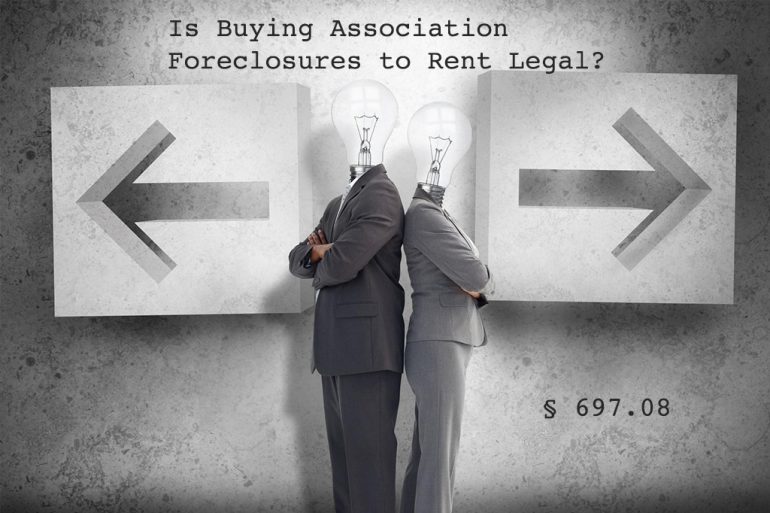Is Buying Association Foreclosures a Violation of F.S. § 697.08?
We previously released a tutorial e-book and article called The HOA Foreclosure Play and a reader rightly brought up in the comment section the legality of this money making strategy in the face of Florida Statute § 697.08. The HOA Foreclosure Play detailed ways to buy Association Foreclosures at the county foreclosure auction and rent it out while other superior mortgages still have no foreclosed in short. So rather than dance around the issue we asked our preferred in house Legal Eagle Jeff Harrington of Harrington Legal Alliance to write a legal opinion on the topic to publish on our site. His legal opinion is published verbatim below.
Florida Statute § 697.08 provides that it is unlawful for any person, with the intent to defraud the owner of real property, to engage in equity skimming. The term “equity skimming” is defined as (i) purchasing more than one residential dwelling, within a three-year period, that is subject to a mortgage in default; (ii) failing to make mortgage payments; and (iii) keeping the rents for “the person’s own use.”
The question that has been posed is whether this statute makes it illegal to purchase properties at HOA foreclosures and then rent them for a profit without making mortgage payments.
The statute provides for criminal penalty (i.e. 3rd degree felony) so it is, indeed, an important question.
In my opinion, F.S. § 697.08 does not prohibit the practice of buying at Association foreclosures and renting out the properties, even when those properties are subject to a mortgage – at least not as the practice is commonly carried out today. But, you should hear the whole analysis – and also consider the federal statute 12 USC 1709-2 – so you can make your own decision.
Starting with the obvious, buying properties at foreclosure auctions, including Association foreclosures, is not only perfectly legal but it is encouraged. All counties in Florida have foreclosure auctions, and all interested parties want to see that practice remain vibrant. It is good for the local economy, and the alternative would likely be far worse. So, why then would a statute like F.S. § 697.08 even be on the books?
My firm has been in the distressed real estate business since the market collapsed in 2008, so I remember when this statute was implemented,[1] and I also remember why it came to prominence. Following the real estate crisis, all Florida markets were impacted but, perhaps in particular, the Miami market. In addition to the devaluation of home values, Miami also had a number of parties actively defrauding homeowners. There were a few variations, but the basic paradigm involved convincing a homeowner to turn over possession of his home with the promise of restructuring the mortgage and/or receiving monthly payments. The homeowner, hoping to avoid foreclosure and minimize damage to credit rating, would then cooperate, only to later find out no mortgage payments were ever made, there were no workout attempts with the lender, and there was no sharing of the rents. On the contrary, the bank would eventually foreclose, leaving the homeowner with all the disadvantages he was hoping to avoid, while someone else made money on his home.
Given this background, you can see why the statute begins with the phrase “intent to defraud the owner of real property.” Contrary to what you might suppose, the statute is meant to protect homeowners, not banks.
So, that is an important legal distinction. When you purchase a property at auction, you become the owner. There may be a mortgage on the property, but you are the title-holder. You are not defrauding the borrower (i.e. former owner), nor do you have any “intent” to do so. The unpaid mortgage may continue to ravage the borrower’s credit rating, but that is not of your making. You did not induce the borrower into that situation.
To put it another way, as the purchaser at an Association auction, you have skin in the game. Your name will be in the public record, you will have to apply to the Association, you will be responsible for Association fees, code violations, upkeep and maintenance, Association fines, etc. Compare that with the Miami fraudsters, who would often leave the property in the borrower’s name and just operate from the shadows. That is why Florida lawmakers were compelled to step in. It was a matter of consumer protection.
The final step of our analysis here is whether Florida courts have used F.S. § 697.08 to punish purchasers at Association auctions. They have not. The prosecutions under the statute have focused on rather egregious actors who prey on mortgagors as described above.
As for 12 USC 1709-2, we will have to deal with that separately. The federal statute is a tiny bit different, but that tiny bit changes the analysis.
~ Jeff Harrington, Esq.
[1] The statute has been around since 1994 but was not much utilized until 2010.








